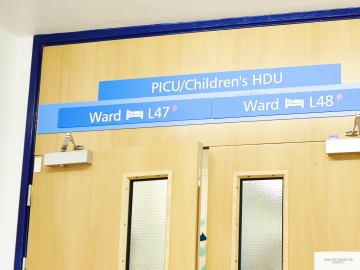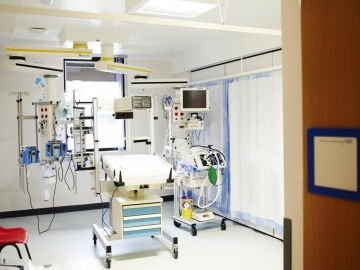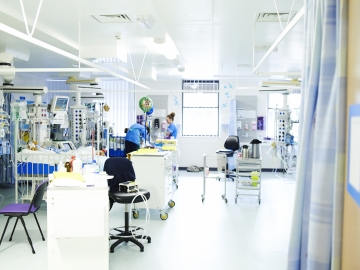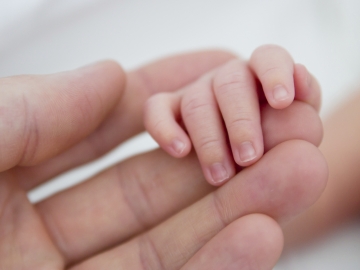Child
- About
- Meet The Team
- Conditions
- Dental Practitioners: Dental care in children at risk of Infective Endocarditis
- Looking after your child’s oral health
- Coming for an echocardiogram
- Outpatient Appointments
- Preparing to Come into Hospital for Surgery
- On Admission to the Children's Ward
- Visiting
- Operation Day
- Children's Intensive Care
- Daily Routine on Intensive Care
- Managing your child's discomfort
- Going Home
- Children's Cardiac MRI Scan
- Cardiac Catheter
- Reveal Device
- Ablation Procedure
- Pacemakers
- INR and Warfarin
- Lifestyle and Exercise Advice
- School Advice
- Attachment
- Yorkshire Regional Genetic Service
- Advice & Support Groups
- Your Views
- Monitoring of Results
- Second Opinion
Daily Routine on Intensive Care
-
Your Child on PICU
Following surgery your child will be brought back to the unit on a bed, cot or baby warmer depending on his/her age. Your child will be attached to a ventilator and monitor.
Intravenous infusions will be set up and an X-ray of the chest will be taken. All this takes about 30 minutes. You will be informed of your child’s arrival onto the unit and also when you will be able to come and visit.
The surgeon will usually come to see you at this time but if he is busy with other cases you will be seen at the earliest opportunity and the operative procedure that has been carried out will be explained.
Sometimes, because parents are so anxious, they do not take in all that is said to them at this stage so if there is anything you have not understood, do ask either the nurse caring for your child or ask to see the doctor. We know that whatever we say you will worry, but we try to lessen your anxiety and keep you fully informed of your child’s condition and any changes in their care.

-
Your Stay
Whilst your child is in intensive care he/she will have one nurse allocated to care for him/her at any one time. This nurse will inform you of your child’s progress and answer your questions. Please feel free to ask her or any other nurse about anything that is worrying you, however, remember that her priority is to your child and there may be times when she is not immediately available to answer questions. The safe recovery of your child involves concentration and watching as well as carrying out cares.
-

Daily Routine
The day starts with a handover of information from the night nursing staff to the day staff. At 8:00 – 8:45am the major doctors round takes place (remember no visiting at this time please). Each child is carefully assessed and medical care for the day is planned. Your child may have a chest X-ray. A physiotherapist, dietician and pharmacist may visit them. At tea time there is another doctors round to check on progress during the day. Throughout the day children are admitted to the unit and discharged to the ward & doctors visit regularly. At weekends the unit is often quieter as there is no operating unless there is an emergency.
-
Visiting
You may visit your child at any time. The ward round occurs between 08.00-08.45, due to reasons of confidentiality we ask you not to be present at this time. You will have opportunity to discuss your child’s care with a doctor later in the day. There is also an evening ward round between 5pm and 6pm and you may be asked to leave the unit at this time also.Whilst close family are welcome to visit, we would stress that children on intensive care require periods of rest in order to aid their recovery and due to the high risk of infection it is not advisable to have lots of people in and out of the unit.
We have a unit policy of two visitors for each child and because space is limited it may be necessary for any others to wait off the unit. This can be reviewed under special circumstances.
Brothers and sisters are encouraged to visit, as often the situation imagined by them is much more distressing than the reality of visiting their sick brother/sister on the intensive care unit. You know your children best and if you feel it appropriate for your children to visit the nurse will support and help prepare them. Please be aware that any children visiting must have parental supervision and are your responsibility whilst on the unit and in the hospital.

-
Before entering the unit please press the intercom button and wait. You will be advised to either come straight through to the unit or to wait in the parent’s room. On entering the unit please hang up outdoor coats and wash your hands before touching your child and also before leaving the unit. To prevent cross infection, it is important that you do not wander into the bed spaces of other patients. The 8 bed bay area has a very open layout which enables us to observe the patients closely. One drawback of this is that privacy is difficult to maintain and we ask you to consider the privacy and dignity of other children when you are visiting your own. For the same reason the nurses are not able to give out information about other children. It is very important that you have periods of rest. It is often better for both parents and children if they have frequent short visits rather than one long visit. We understand that this is not always possible.
There is no objection to using your own phones, cameras and camcorders on the unit, but we do ask that the privacy of the other patients and their families is respected.
-

Your Role on the Unit
Even though your child is very poorly we will encourage you to continue to care for him/her by becoming involved in such tasks as mouth and eye care and nappy changes. You may initially be too upset or frightened to do this – don’t worry, lots of people feel like this at first.
The nurse caring for your child will help you and make sure you know what you can and cannot move. If you would like to be involved in your child’s care please discuss this with the nurse caring for your child and we will do our best to plan such events as feeds and washes to fit in with you. Even though your child may be heavily sedated and can not respond to you, it is very important to hold your child’s hand and talk to him/her as he/she may be able to hear you.
-
Holding hands and gentle touch is good for both you and your child but sick children need complete rest and quiet so trying to wake or stimulate them before they are ready is inadvisable. Sometimes just to sit quietly without touching your child may be in his/her best interests. The nurse looking after your child will advise you.
We would appreciate if you could provide toiletries for your child i.e. toothbrush/paste, flannel, hairbrush/comb. We also ask that you supply your own nappies for babies. If your child has long hair, a scrunchie with no metallic pieces will be useful to tie hair back before their operation. Children often prefer to wear their own clothes. You may want to bring in socks and pyjama bottoms for older children or socks and bootees for a baby. Once your child is getting better he/she may be dressed and will need light clothes to wear. Please ask the nurse looking after your child for advice. If your child has a favorite toy, cuddly blanket or comforter, please bring it in (it is a good idea to make sure these items are newly laundered and clean because your child is at greater risk of infection after his/her operation). You may also like to bring in cassette tapes, videos or books for your child and photos from home.
Leaving Intensive Care
Once your child’s condition is stable and he/she is breathing unaided, your child will be transferred to either the high dependency unit or ward area on the cardiology ward (ward L51) on D Floor Clarendon Wing This is often a stressful time for parents because in the intensive care unit he/she will have a nurse all to him / herself and on the ward will have to share a nurse with other patients. Unless your child is well enouh, he/she will not be moved, so try not to worry!
